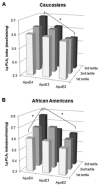Apo E4 and lipoprotein-associated phospholipase A2 synergistically increase cardiovascular risk
- PMID: 22632920
- PMCID: PMC3389284
- DOI: 10.1016/j.atherosclerosis.2012.04.021
Apo E4 and lipoprotein-associated phospholipase A2 synergistically increase cardiovascular risk
Abstract
Objective: Apolipoprotein E (apoE) has been implicated as conveying increased risk for coronary artery disease (CAD). Previous studies suggest a role of apoE as a modulator of immune response and inflammatory properties. We hypothesized that the presence of apo E4 is associated with an increased inflammatory burden in subjects with CAD as compared to subjects without CAD.
Methods: ApoE genotypes, systemic (C-reactive protein [CRP], fibrinogen, serum amyloid-A [SAA]) and vascular inflammatory markers (Lipoprotein-associated phospholipase A(2) [Lp-PLA(2)] and pentraxin-3 [PTX-3]) were assessed in 324 Caucasians and 208 African Americans, undergoing coronary angiography.
Results: For both ethnic groups, Lp-PLA(2) index, an integrated measure of Lp-PLA(2) mass and activity, increased significantly and stepwise across apoE isoforms (P = 0.009 and P = 0.026 for African Americans and Caucasians respectively). No differences were found for other inflammatory markers tested (CRP, fibrinogen, SAA and PTX-3). For the top cardiovascular score tertile, apo E4 carriers had a significantly higher level of Lp-PLA(2) index in both ethnic groups (P = 0.027 and P = 0.010, respectively).
Conclusion: The presence of the apo E4 isoform was associated with a higher level of Lp-PLA(2) index, a marker of vascular inflammation. Our results suggest that genetic variation at the apoE locus may impact cardiovascular disease risk through enhanced vascular inflammation.
Published by Elsevier Ireland Ltd.
Figures


References
-
- Ross R. Atherosclerosis-an inflammatory disease. N Engl J Med. 1999;340:115–126. - PubMed
-
- Eichner JE, Dunn ST, Perveen G, et al. Apolipoprotein E polymorphism and cardiovascular disease: a HuGE review. Am J Epidemiol. 2002;155:487–495. - PubMed
-
- Gerdes LU, Gerdes C, Kervinen K, et al. The apolipoprotein epsilon4 allele determines prognosis and the effect on prognosis of simvastatin in survivors of myocardial infarction : a substudy of the Scandinavian simvastatin survival study. Circulation. 2000;101:1366–1371. - PubMed
-
- Anuurad E, Rubin J, Lu G, et al. Protective effect of apolipoprotein E2 on coronary artery disease in African Americans is mediated through lipoprotein cholesterol. J Lipid Res. 2006;47:2475–2481. - PubMed
-
- Howard BV, Gidding SS, Liu K. Association of apolipoprotein E phenotype with plasma lipoproteins in African-American and white young adults. The CARDIA Study. Coronary Artery Risk Development in Young Adults. Am J Epidemiol. 1998;148:859–868. - PubMed
Publication types
MeSH terms
Substances
Grants and funding
LinkOut - more resources
Full Text Sources
Medical
Research Materials
Miscellaneous

